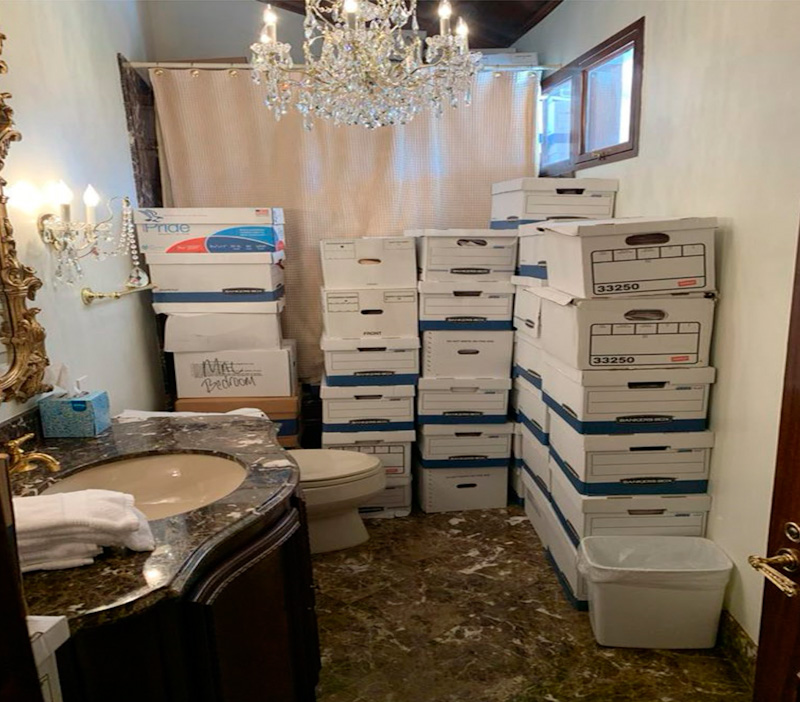Supreme Court rules for prosecutors in venue case that might have influenced Trump charging decision

This image, contained in the indictment against former President Donald Trump, shows boxes of records stored in a bathroom and shower at Trump's Mar-a-Lago estate in Palm Beach, Florida. Photo by the U.S. Department of Justice via the Associated Press.
The U.S. Supreme Court ruled Thursday that a criminal defendant can be retried in a new venue if the first trial was held in the wrong place.
The Supreme Court ruled for prosecutors in a unanimous opinion by Justice Samuel Alito.
Some had speculated that special counsel Jack Smith brought charges against former President Donald Trump in federal court in Miami, rather than Washington, D.C., because of fears that a wrong decision on venue would imperil the classified documents case.
It “appears that fear was misplaced,” said a commenter on SCOTUSblog as it live-blogged the release of decisions Thursday.
The District of Columbia is thought to be a more favorable jurisdiction for prosecutors to try Trump, partly because the jury pool there is likely to include more Democrats.
Alito ruled in the case of software engineer and fisherman Timothy J. Smith, who was accused of hacking into the website of a Pensacola, Florida-based company and stealing information on the locations of artificial fishing reefs. Smith was tried in Pensacola, Florida, where he was acquitted of a federal hacking charge but convicted for theft of trade secrets and extortion.
Smith had claimed that the venue in Pensacola, Florida, was improper because he accessed the data in the Southern District of Alabama, and the company’s servers were in the Middle District of Florida.
The usual rule is that a retrial is the remedy for a conviction obtained in a proceeding marred by prejudicial error, Alito said.
“We consider in this case whether the Constitution requires a different outcome when a conviction is reversed because the prosecution occurred in the wrong venue and before a jury drawn from the wrong location. We hold that it does not,” Alito wrote.
Neither the venue clause of Article III of the Constitution nor the Sixth Amendment’s vicinage clause bans a retrial as the proper remedy for a violation, Alito said.
The venue clause mandates that a criminal trial be held “in the state where the … crimes shall have been committed.” The vicinage clause guarantees “the right to … an impartial jury of the state and district wherein the crime shall have been committed.”
A reversal for violation of these clauses does not trigger the double jeopardy clause, Alito said, because the reversal is not based on “the bottom-line question” of criminal culpability.
The venue issue could provide a “backup plan” for special counsel Smith’s prosecution of Trump, according to an article in the Atlantic. The Miami indictment of Trump alleges that he briefly showed classified documents to people at his home and golf club in Bedminster, New Jersey.
The Atlantic article raised “the intriguing possibility” that there could be a second indictment of Trump in New Jersey, particularly if things aren’t going well before U.S. District Judge Aileen M. Cannon of the Southern District of Florida, who has been assigned the case in Florida.
See also:
ABAJournal.com: “How Rule 29 motion could save Trump in classified documents case; what are other possibilities?”
ABAJournal.com: “CNN obtains transcript of tape that is highlighted in unsealed espionage charges against Trump”



